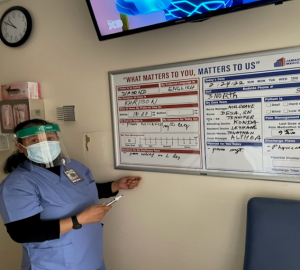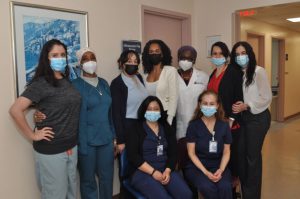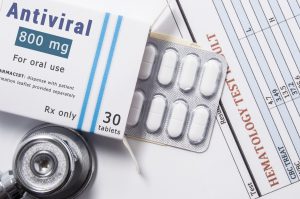This month, we are proud to shine our Employee Spotlight on Sandra Leon Gonzalez, office manager of the TJH Surgical Suite. She has been with our hospital for 24 years.
Sandra was born in Ecuador and at nine years of age moved to New York. Her family first resided in Hollis, Queens and then when she was 10, moved to Richmond Hill. She attended P.S. 55, J.H.S. 226, Hillcrest High School and Queensborough Community College. As a resident of Richmond Hill, she was always familiar with the Jamaica Hospital name in the community.
Sandra is married to her husband Johnny for 37 years and has two sons, Michael who is 33 years old and Nicholas who is 27. She also has a grandson Jacob who is 6 months old. Sandra has a dog named Jackson who is one-half Labrador and one-half American bulldog.
In her free time, Sandra enjoys spending time with family and friends, attending concerts, Broadway shows and dancing whenever possible. She also enjoys traveling, especially to Italy where she has been twice, France, Spain and of course her native Ecuador. Her favorite types of food are Spanish and Italian. Sandra likes many different types of music, this includes disco, Motown, jazz, Latin and anything else she can dance to. She is also a soccer, baseball, and golf enthusiast.
Making a difference and treating people with respect are very important to Sandra. This is why working at the TJH Surgical Suite has been a rewarding experience.
She believes in fostering an environment that is mindful of cultural sensitivities and one that allows patients to feel supported in voicing their concerns and opinions. Sandra has seen the Surgical Suite expand tremendously over the years and is very proud of its growth and contributions to the well-being of people in the community. She is grateful to her department’s leadership and staff for making this possible.
We are very happy to have Sandra as part of our team at Jamaica Hospital Medical Center and we look forward to her being with us for many years to come.
All content of this newsletter is intended for general information purposes only and is not intended or implied to be a substitute for professional medical advice, diagnosis or treatment. Please consult a medical professional before adopting any of the suggestions on this page. You must never disregard professional medical advice or delay seeking medical treatment based upon any content of this newsletter. PROMPTLY CONSULT YOUR PHYSICIAN OR CALL 911 IF YOU BELIEVE YOU HAVE A MEDICAL EMERGENCY.













